ISYS 324: Business Analysis Case Study - Holiday Inc. Airline System
VerifiedAdded on 2023/06/03
|17
|2128
|437
Case Study
AI Summary
This document presents a business analysis of Holiday Inc.'s proposed new airline information system, encompassing flight reservation, travel services, human resource management, and finance/accounting modules. It details system services, functional and non-functional requirements, data requirements including an entity-relationship diagram and data dictionary, and specifies acceptance criteria. The analysis quantifies business benefits such as improved customer service, revenue generation, and streamlined resource management. It outlines acceptance testing procedures including unit, integration, recovery, security, and user acceptance testing to ensure the system meets specified requirements and user expectations, ultimately concluding that the integrated system will offer cost-effectiveness, improved performance, and enhanced customer experience.
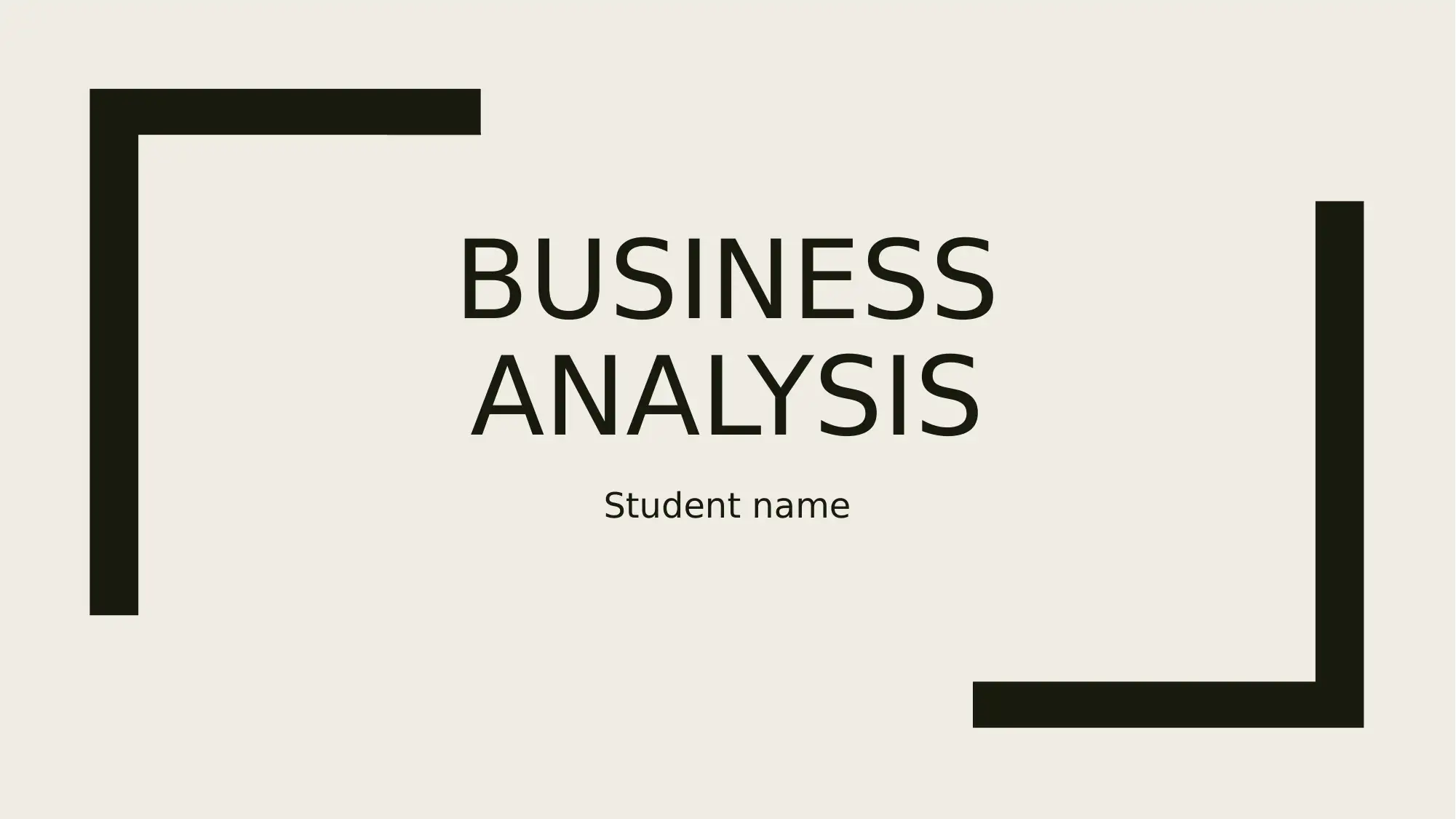
BUSINESS
ANALYSIS
Student name
ANALYSIS
Student name
Paraphrase This Document
Need a fresh take? Get an instant paraphrase of this document with our AI Paraphraser
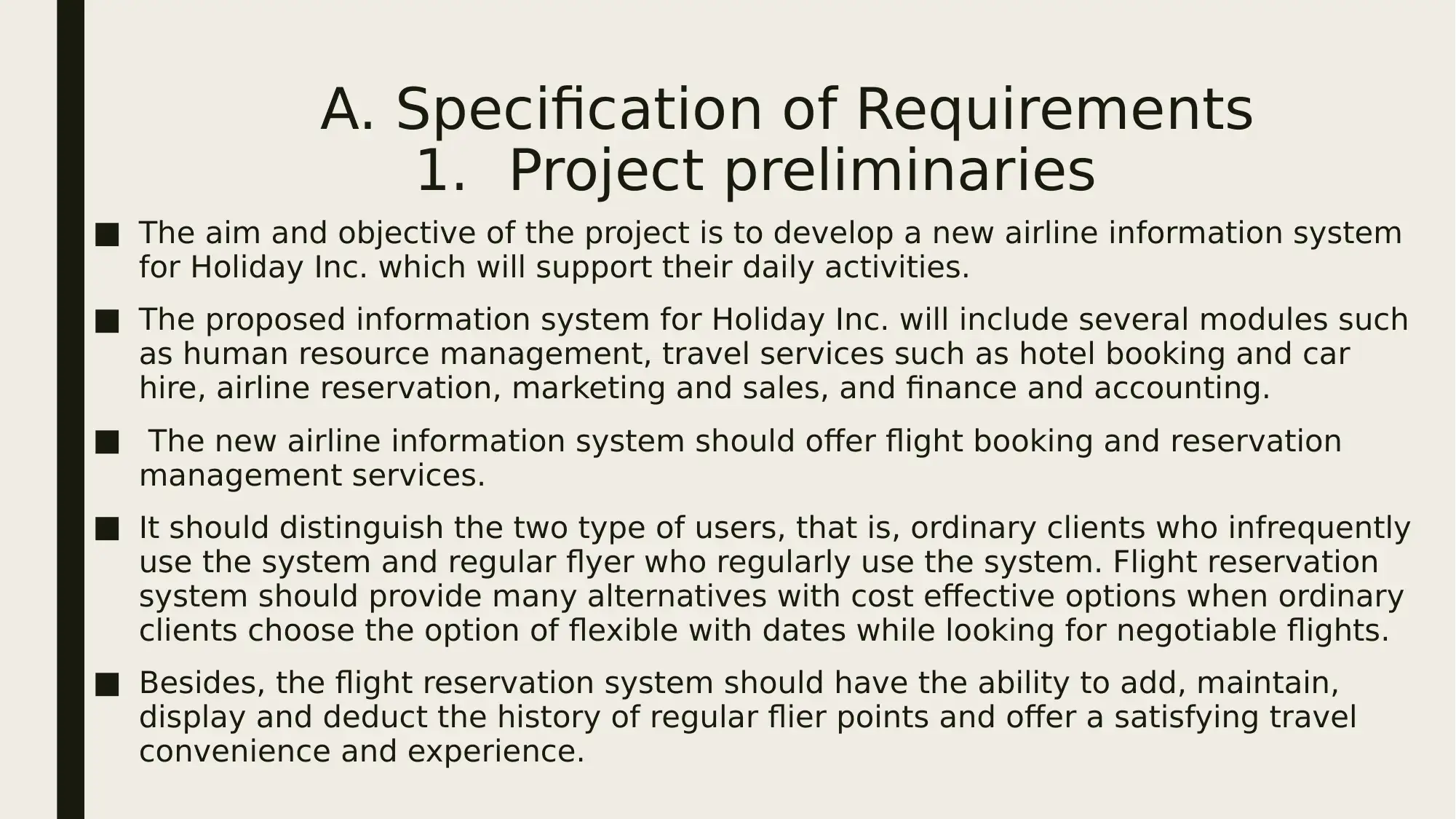
A. Specification of Requirements
1. Project preliminaries
■ The aim and objective of the project is to develop a new airline information system
for Holiday Inc. which will support their daily activities.
■ The proposed information system for Holiday Inc. will include several modules such
as human resource management, travel services such as hotel booking and car
hire, airline reservation, marketing and sales, and finance and accounting.
■ The new airline information system should offer flight booking and reservation
management services.
■ It should distinguish the two type of users, that is, ordinary clients who infrequently
use the system and regular flyer who regularly use the system. Flight reservation
system should provide many alternatives with cost effective options when ordinary
clients choose the option of flexible with dates while looking for negotiable flights.
■ Besides, the flight reservation system should have the ability to add, maintain,
display and deduct the history of regular flier points and offer a satisfying travel
convenience and experience.
1. Project preliminaries
■ The aim and objective of the project is to develop a new airline information system
for Holiday Inc. which will support their daily activities.
■ The proposed information system for Holiday Inc. will include several modules such
as human resource management, travel services such as hotel booking and car
hire, airline reservation, marketing and sales, and finance and accounting.
■ The new airline information system should offer flight booking and reservation
management services.
■ It should distinguish the two type of users, that is, ordinary clients who infrequently
use the system and regular flyer who regularly use the system. Flight reservation
system should provide many alternatives with cost effective options when ordinary
clients choose the option of flexible with dates while looking for negotiable flights.
■ Besides, the flight reservation system should have the ability to add, maintain,
display and deduct the history of regular flier points and offer a satisfying travel
convenience and experience.
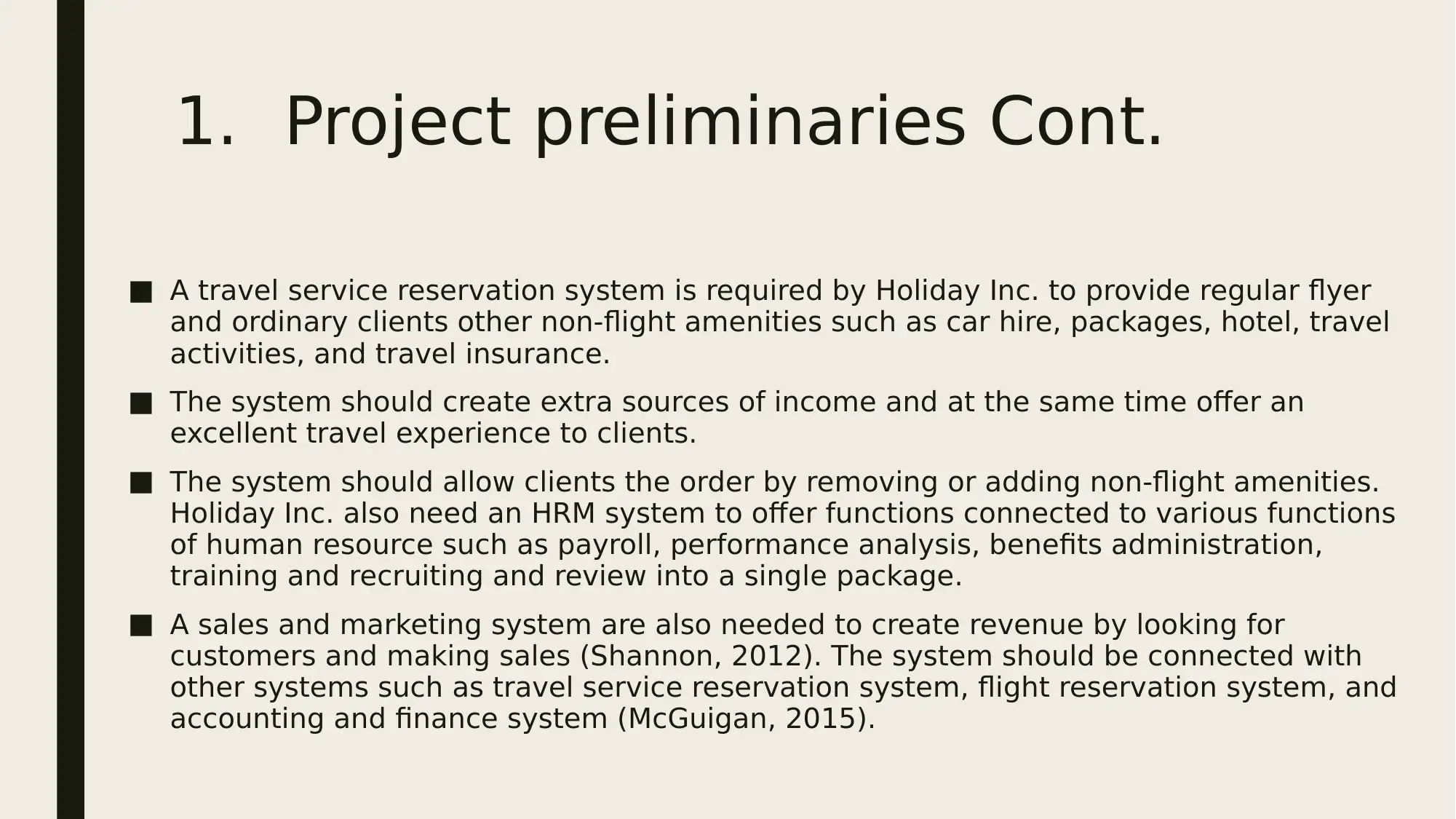
1. Project preliminaries Cont.
■ A travel service reservation system is required by Holiday Inc. to provide regular flyer
and ordinary clients other non-flight amenities such as car hire, packages, hotel, travel
activities, and travel insurance.
■ The system should create extra sources of income and at the same time offer an
excellent travel experience to clients.
■ The system should allow clients the order by removing or adding non-flight amenities.
Holiday Inc. also need an HRM system to offer functions connected to various functions
of human resource such as payroll, performance analysis, benefits administration,
training and recruiting and review into a single package.
■ A sales and marketing system are also needed to create revenue by looking for
customers and making sales (Shannon, 2012). The system should be connected with
other systems such as travel service reservation system, flight reservation system, and
accounting and finance system (McGuigan, 2015).
■ A travel service reservation system is required by Holiday Inc. to provide regular flyer
and ordinary clients other non-flight amenities such as car hire, packages, hotel, travel
activities, and travel insurance.
■ The system should create extra sources of income and at the same time offer an
excellent travel experience to clients.
■ The system should allow clients the order by removing or adding non-flight amenities.
Holiday Inc. also need an HRM system to offer functions connected to various functions
of human resource such as payroll, performance analysis, benefits administration,
training and recruiting and review into a single package.
■ A sales and marketing system are also needed to create revenue by looking for
customers and making sales (Shannon, 2012). The system should be connected with
other systems such as travel service reservation system, flight reservation system, and
accounting and finance system (McGuigan, 2015).
⊘ This is a preview!⊘
Do you want full access?
Subscribe today to unlock all pages.

Trusted by 1+ million students worldwide
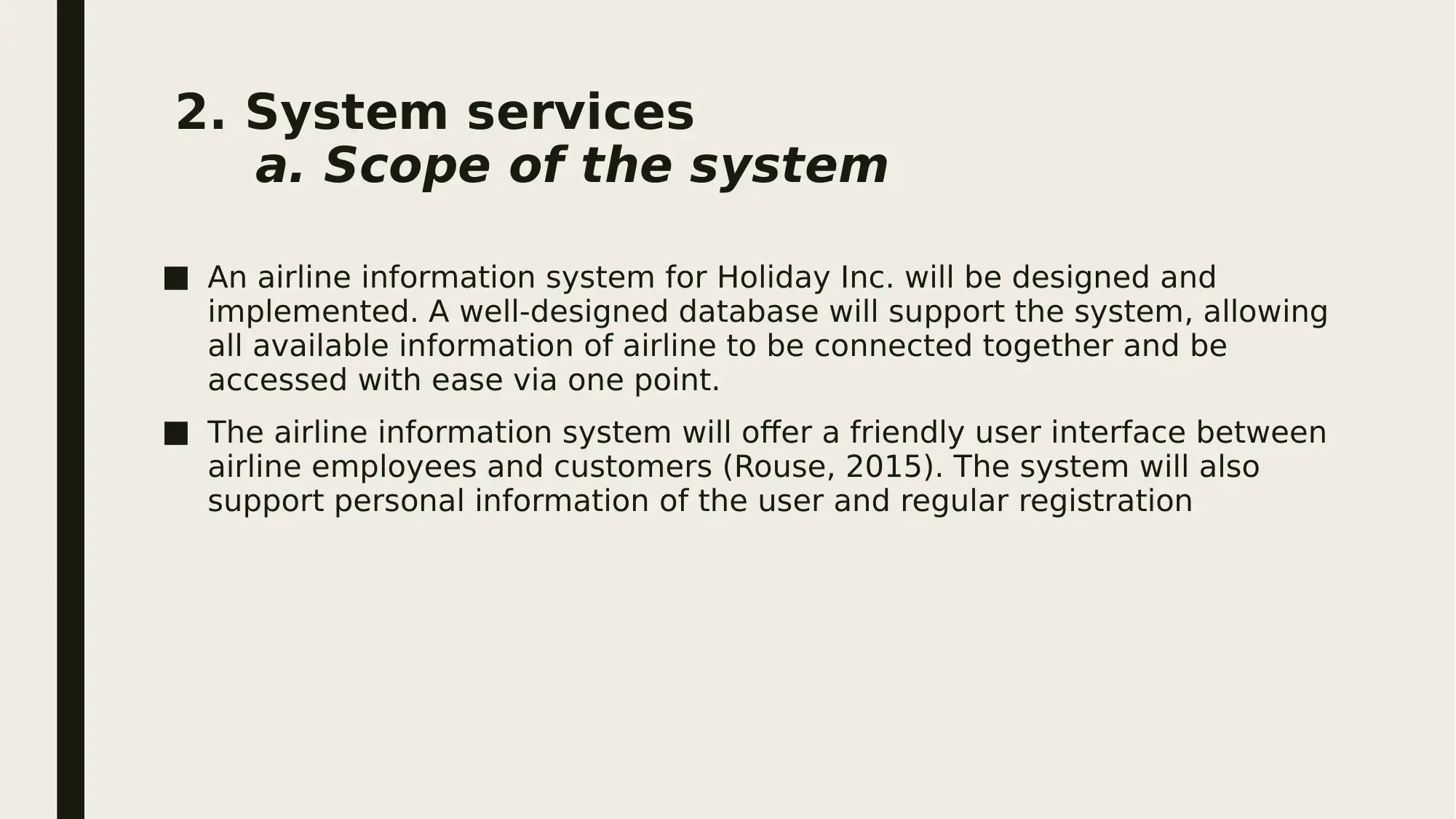
2. System services
a. Scope of the system
■ An airline information system for Holiday Inc. will be designed and
implemented. A well-designed database will support the system, allowing
all available information of airline to be connected together and be
accessed with ease via one point.
■ The airline information system will offer a friendly user interface between
airline employees and customers (Rouse, 2015). The system will also
support personal information of the user and regular registration
a. Scope of the system
■ An airline information system for Holiday Inc. will be designed and
implemented. A well-designed database will support the system, allowing
all available information of airline to be connected together and be
accessed with ease via one point.
■ The airline information system will offer a friendly user interface between
airline employees and customers (Rouse, 2015). The system will also
support personal information of the user and regular registration
Paraphrase This Document
Need a fresh take? Get an instant paraphrase of this document with our AI Paraphraser
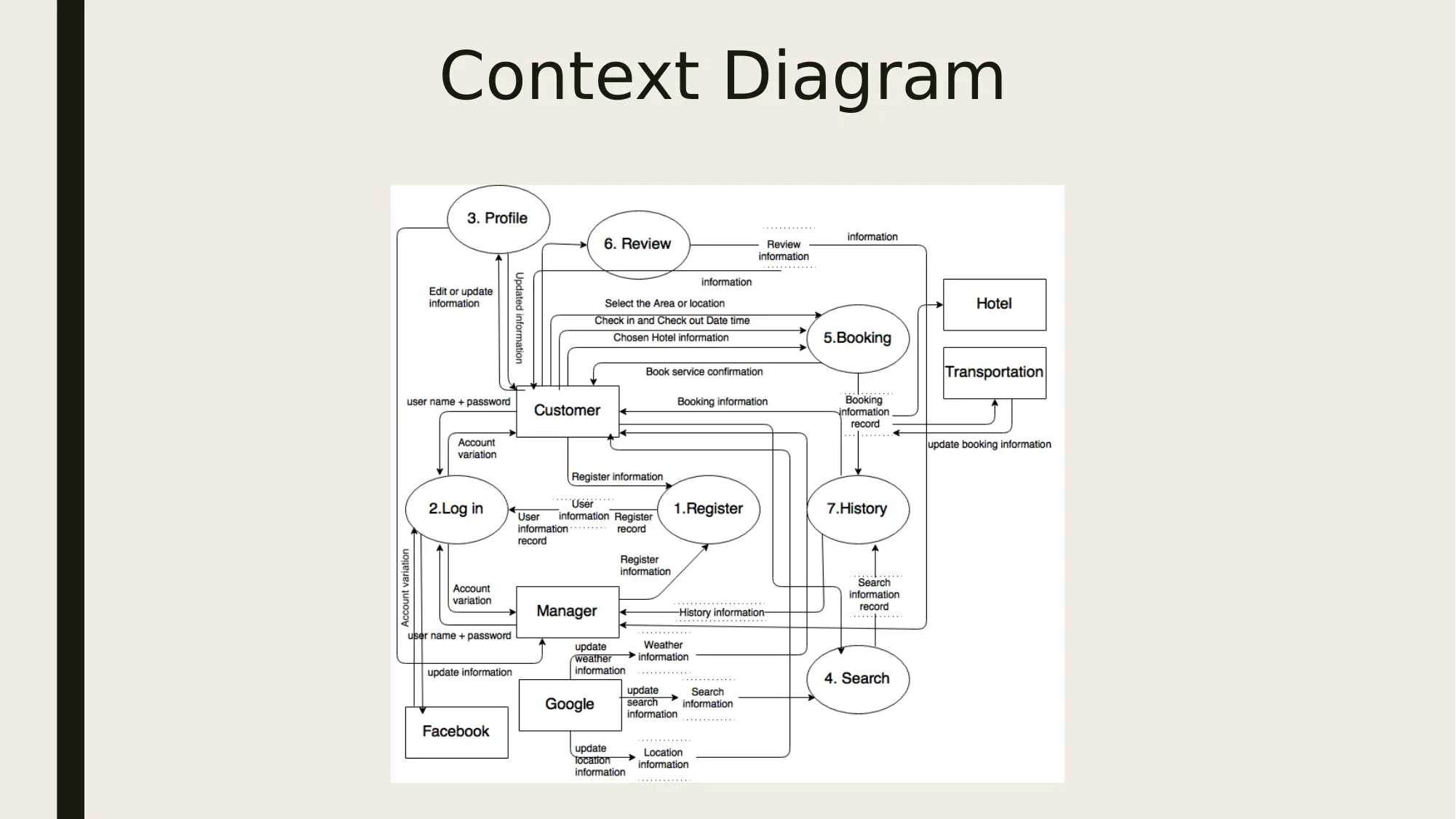
Context Diagram
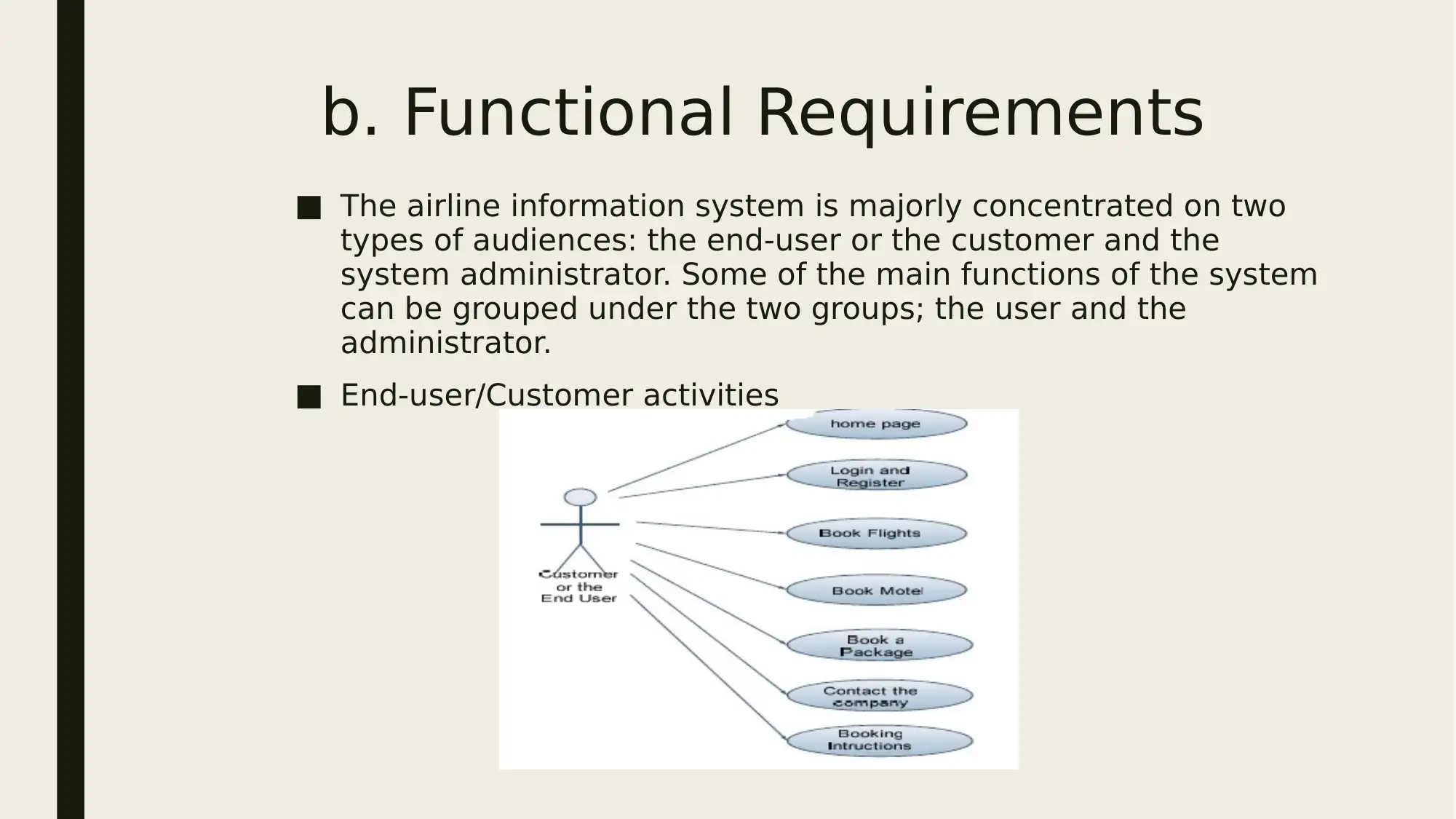
b. Functional Requirements
■ The airline information system is majorly concentrated on two
types of audiences: the end-user or the customer and the
system administrator. Some of the main functions of the system
can be grouped under the two groups; the user and the
administrator.
■ End-user/Customer activities
■ The airline information system is majorly concentrated on two
types of audiences: the end-user or the customer and the
system administrator. Some of the main functions of the system
can be grouped under the two groups; the user and the
administrator.
■ End-user/Customer activities
⊘ This is a preview!⊘
Do you want full access?
Subscribe today to unlock all pages.

Trusted by 1+ million students worldwide
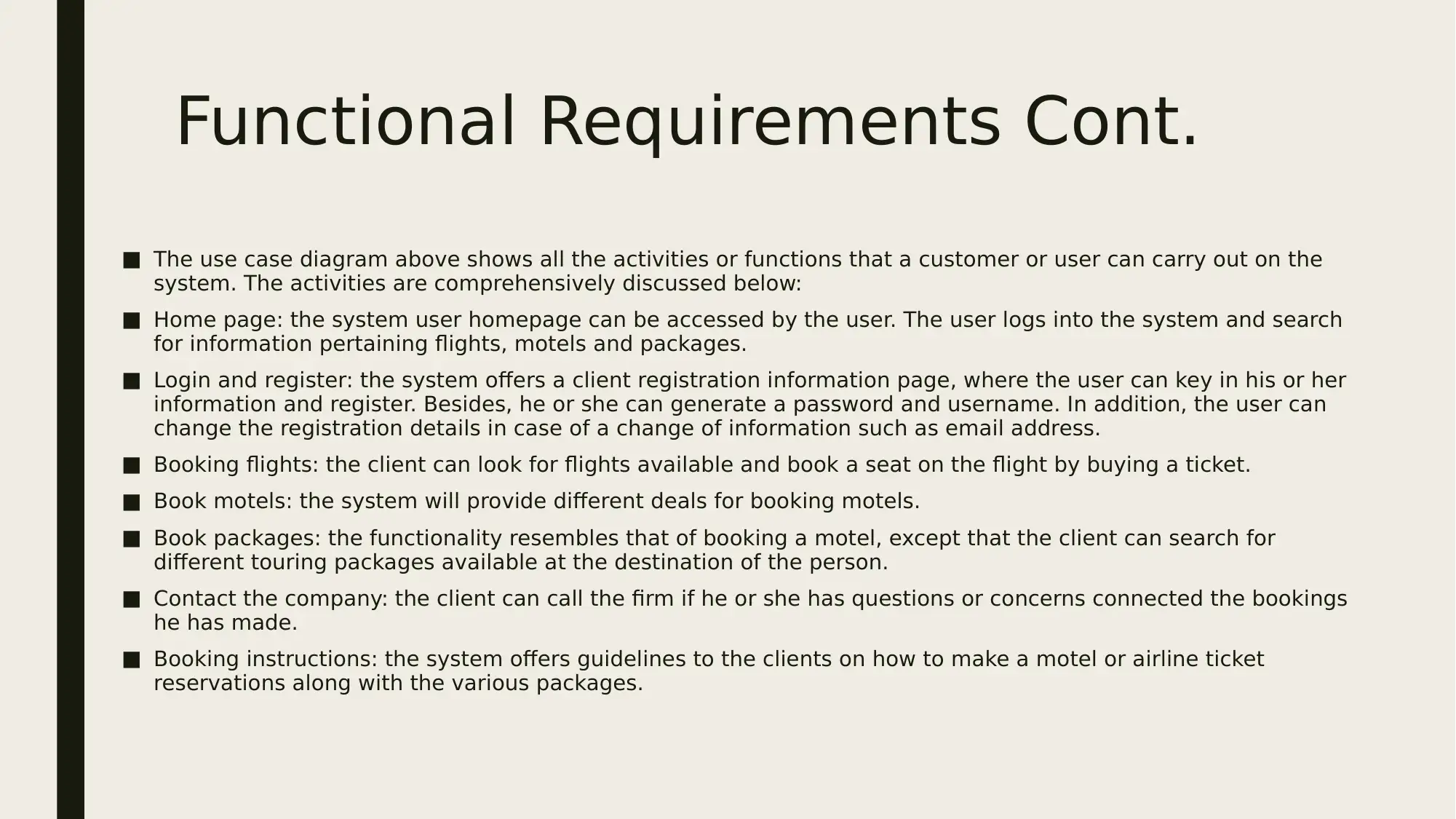
Functional Requirements Cont.
■ The use case diagram above shows all the activities or functions that a customer or user can carry out on the
system. The activities are comprehensively discussed below:
■ Home page: the system user homepage can be accessed by the user. The user logs into the system and search
for information pertaining flights, motels and packages.
■ Login and register: the system offers a client registration information page, where the user can key in his or her
information and register. Besides, he or she can generate a password and username. In addition, the user can
change the registration details in case of a change of information such as email address.
■ Booking flights: the client can look for flights available and book a seat on the flight by buying a ticket.
■ Book motels: the system will provide different deals for booking motels.
■ Book packages: the functionality resembles that of booking a motel, except that the client can search for
different touring packages available at the destination of the person.
■ Contact the company: the client can call the firm if he or she has questions or concerns connected the bookings
he has made.
■ Booking instructions: the system offers guidelines to the clients on how to make a motel or airline ticket
reservations along with the various packages.
■ The use case diagram above shows all the activities or functions that a customer or user can carry out on the
system. The activities are comprehensively discussed below:
■ Home page: the system user homepage can be accessed by the user. The user logs into the system and search
for information pertaining flights, motels and packages.
■ Login and register: the system offers a client registration information page, where the user can key in his or her
information and register. Besides, he or she can generate a password and username. In addition, the user can
change the registration details in case of a change of information such as email address.
■ Booking flights: the client can look for flights available and book a seat on the flight by buying a ticket.
■ Book motels: the system will provide different deals for booking motels.
■ Book packages: the functionality resembles that of booking a motel, except that the client can search for
different touring packages available at the destination of the person.
■ Contact the company: the client can call the firm if he or she has questions or concerns connected the bookings
he has made.
■ Booking instructions: the system offers guidelines to the clients on how to make a motel or airline ticket
reservations along with the various packages.
Paraphrase This Document
Need a fresh take? Get an instant paraphrase of this document with our AI Paraphraser
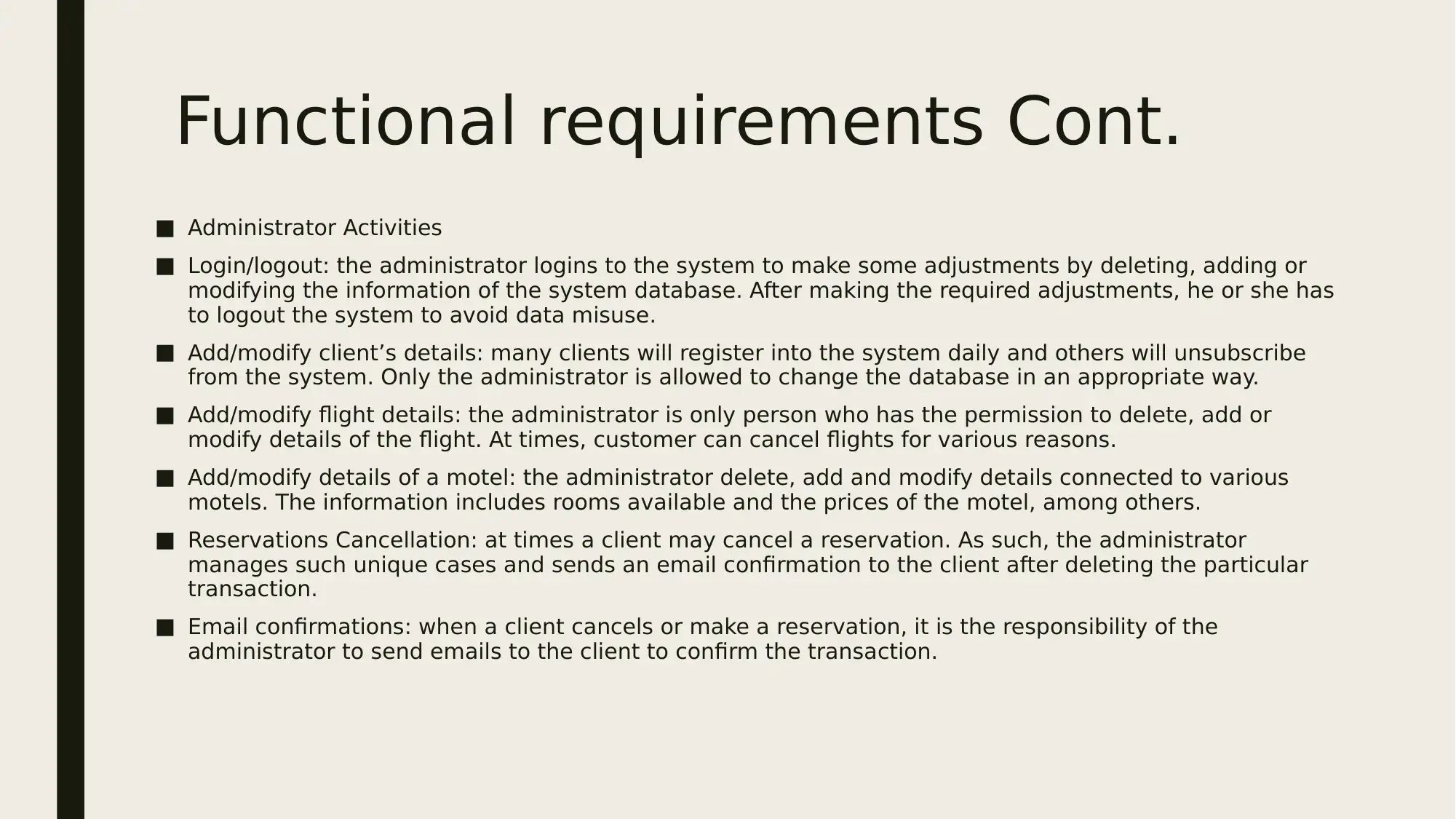
Functional requirements Cont.
■ Administrator Activities
■ Login/logout: the administrator logins to the system to make some adjustments by deleting, adding or
modifying the information of the system database. After making the required adjustments, he or she has
to logout the system to avoid data misuse.
■ Add/modify client’s details: many clients will register into the system daily and others will unsubscribe
from the system. Only the administrator is allowed to change the database in an appropriate way.
■ Add/modify flight details: the administrator is only person who has the permission to delete, add or
modify details of the flight. At times, customer can cancel flights for various reasons.
■ Add/modify details of a motel: the administrator delete, add and modify details connected to various
motels. The information includes rooms available and the prices of the motel, among others.
■ Reservations Cancellation: at times a client may cancel a reservation. As such, the administrator
manages such unique cases and sends an email confirmation to the client after deleting the particular
transaction.
■ Email confirmations: when a client cancels or make a reservation, it is the responsibility of the
administrator to send emails to the client to confirm the transaction.
■ Administrator Activities
■ Login/logout: the administrator logins to the system to make some adjustments by deleting, adding or
modifying the information of the system database. After making the required adjustments, he or she has
to logout the system to avoid data misuse.
■ Add/modify client’s details: many clients will register into the system daily and others will unsubscribe
from the system. Only the administrator is allowed to change the database in an appropriate way.
■ Add/modify flight details: the administrator is only person who has the permission to delete, add or
modify details of the flight. At times, customer can cancel flights for various reasons.
■ Add/modify details of a motel: the administrator delete, add and modify details connected to various
motels. The information includes rooms available and the prices of the motel, among others.
■ Reservations Cancellation: at times a client may cancel a reservation. As such, the administrator
manages such unique cases and sends an email confirmation to the client after deleting the particular
transaction.
■ Email confirmations: when a client cancels or make a reservation, it is the responsibility of the
administrator to send emails to the client to confirm the transaction.
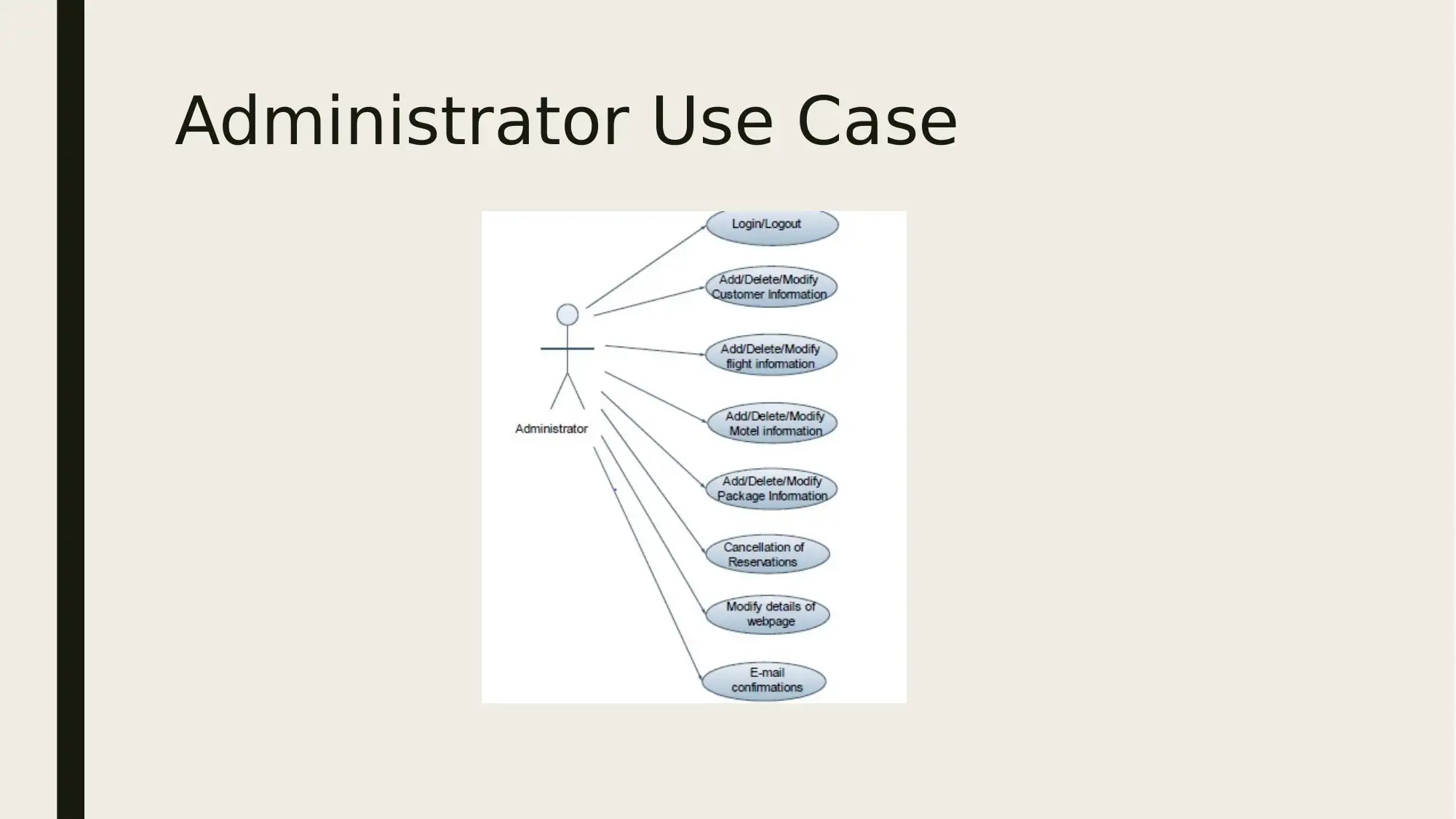
Administrator Use Case
⊘ This is a preview!⊘
Do you want full access?
Subscribe today to unlock all pages.

Trusted by 1+ million students worldwide
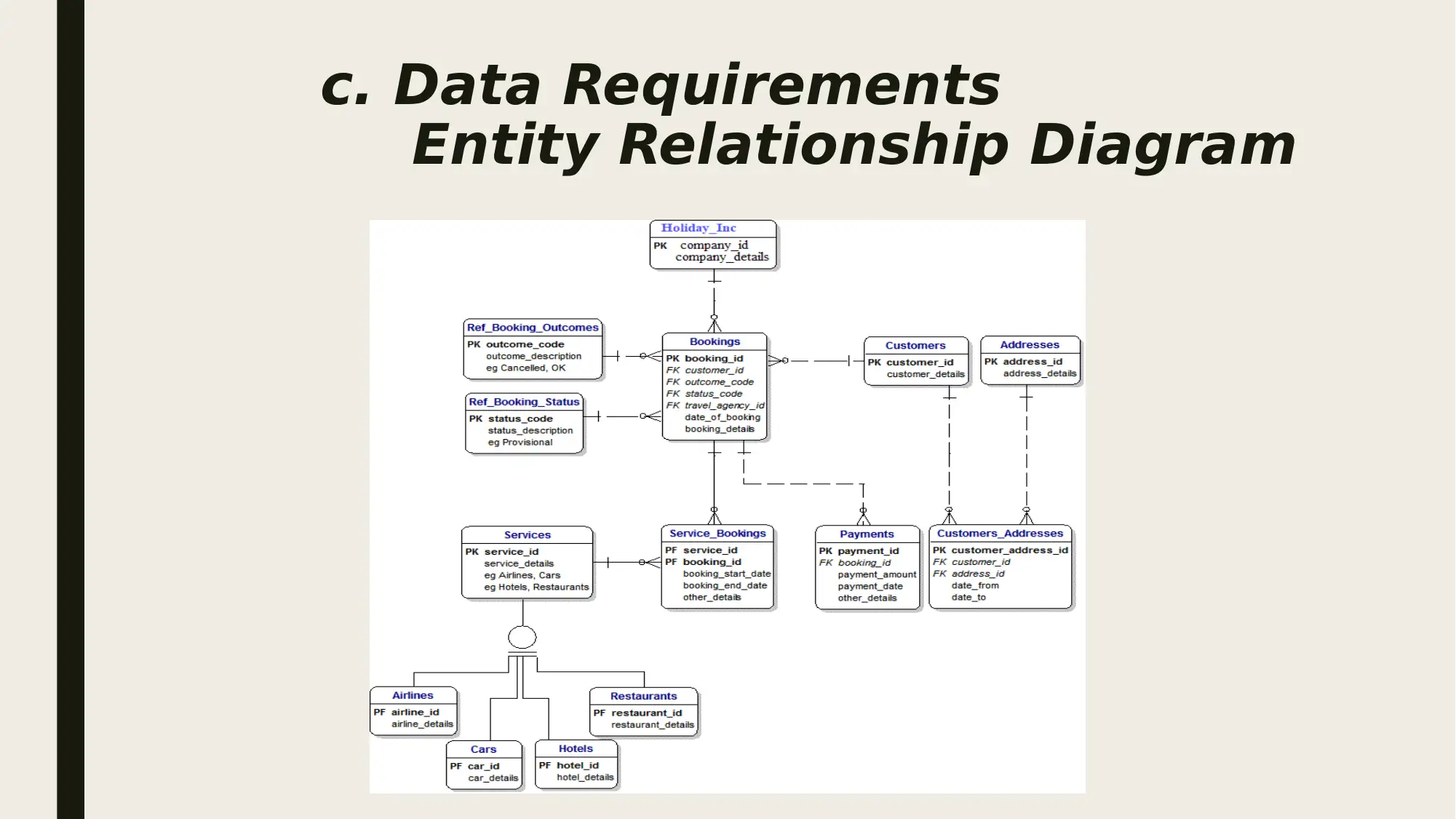
c. Data Requirements
Entity Relationship Diagram
Entity Relationship Diagram
Paraphrase This Document
Need a fresh take? Get an instant paraphrase of this document with our AI Paraphraser
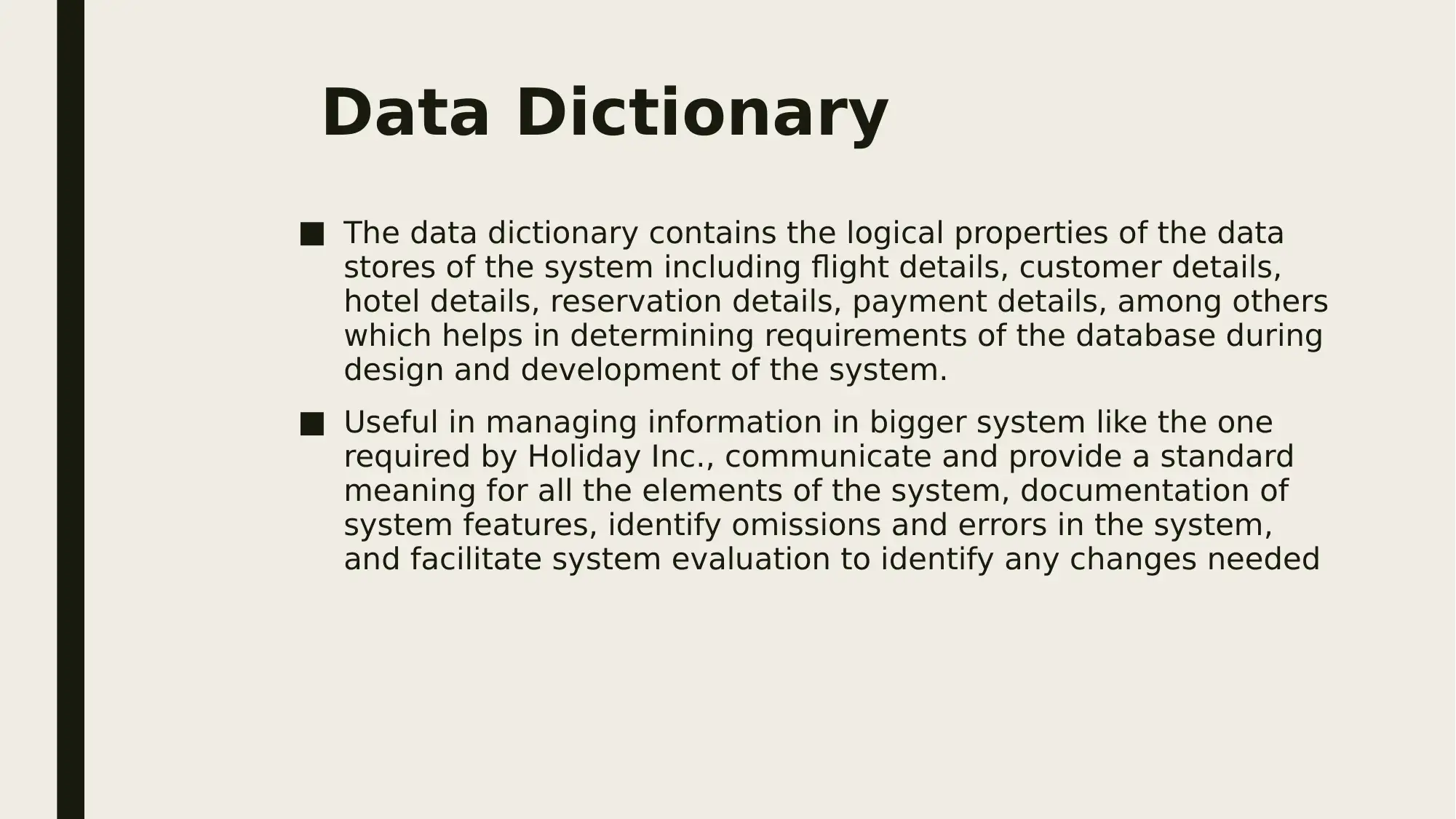
Data Dictionary
■ The data dictionary contains the logical properties of the data
stores of the system including flight details, customer details,
hotel details, reservation details, payment details, among others
which helps in determining requirements of the database during
design and development of the system.
■ Useful in managing information in bigger system like the one
required by Holiday Inc., communicate and provide a standard
meaning for all the elements of the system, documentation of
system features, identify omissions and errors in the system,
and facilitate system evaluation to identify any changes needed
■ The data dictionary contains the logical properties of the data
stores of the system including flight details, customer details,
hotel details, reservation details, payment details, among others
which helps in determining requirements of the database during
design and development of the system.
■ Useful in managing information in bigger system like the one
required by Holiday Inc., communicate and provide a standard
meaning for all the elements of the system, documentation of
system features, identify omissions and errors in the system,
and facilitate system evaluation to identify any changes needed
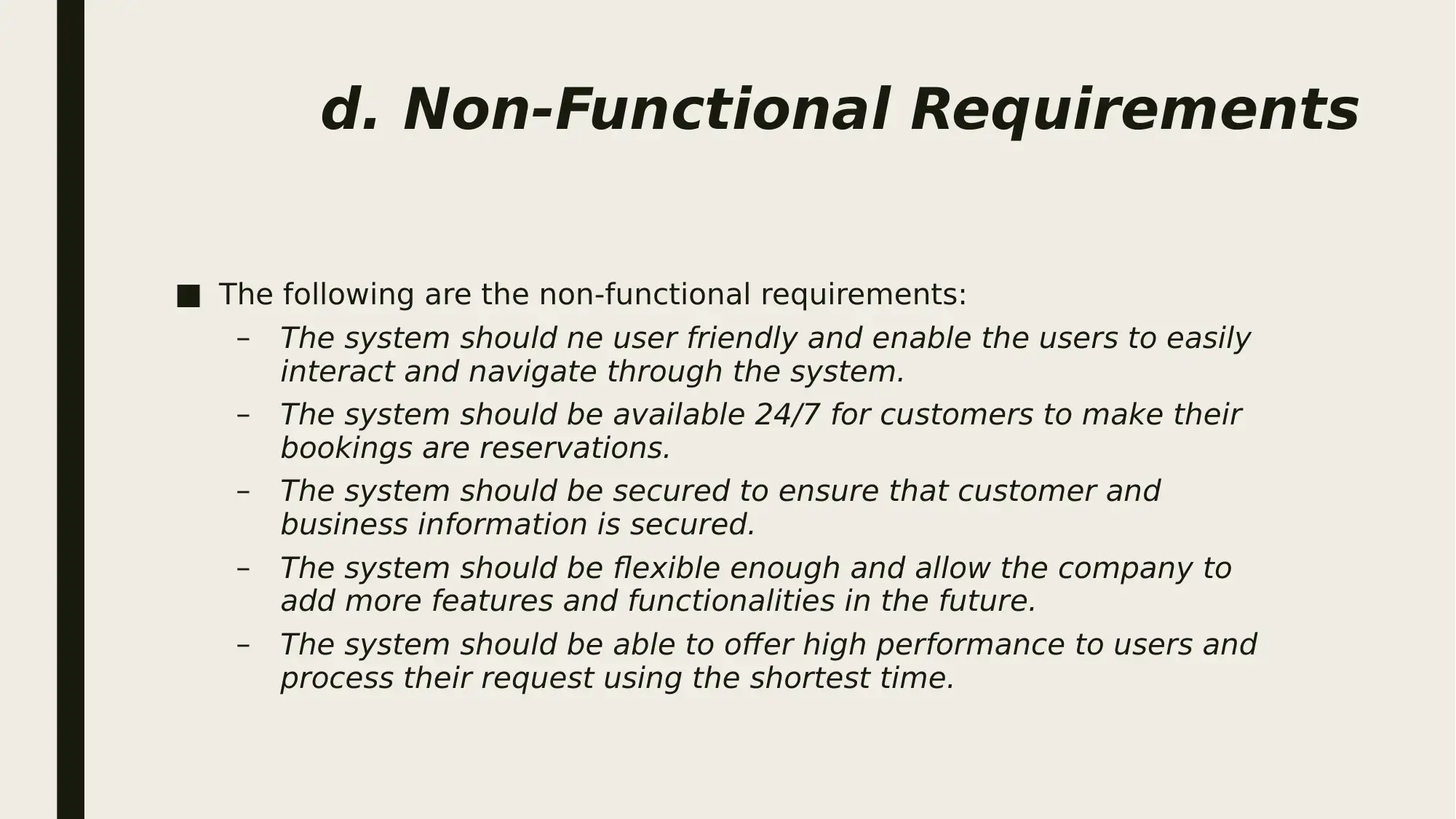
d. Non-Functional Requirements
■ The following are the non-functional requirements:
– The system should ne user friendly and enable the users to easily
interact and navigate through the system.
– The system should be available 24/7 for customers to make their
bookings are reservations.
– The system should be secured to ensure that customer and
business information is secured.
– The system should be flexible enough and allow the company to
add more features and functionalities in the future.
– The system should be able to offer high performance to users and
process their request using the shortest time.
■ The following are the non-functional requirements:
– The system should ne user friendly and enable the users to easily
interact and navigate through the system.
– The system should be available 24/7 for customers to make their
bookings are reservations.
– The system should be secured to ensure that customer and
business information is secured.
– The system should be flexible enough and allow the company to
add more features and functionalities in the future.
– The system should be able to offer high performance to users and
process their request using the shortest time.
⊘ This is a preview!⊘
Do you want full access?
Subscribe today to unlock all pages.

Trusted by 1+ million students worldwide
1 out of 17
Related Documents
Your All-in-One AI-Powered Toolkit for Academic Success.
+13062052269
info@desklib.com
Available 24*7 on WhatsApp / Email
![[object Object]](/_next/static/media/star-bottom.7253800d.svg)
Unlock your academic potential
Copyright © 2020–2026 A2Z Services. All Rights Reserved. Developed and managed by ZUCOL.





